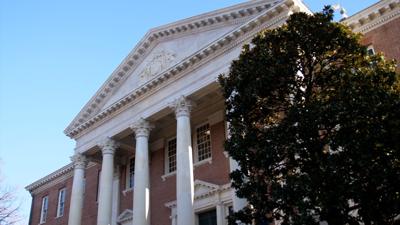ANNAPOLIS, Md. (AP) — The Maryland General Assembly opens its annual 90-day legislative session on Wednesday with lawmakers set to wrestle with budget challenges as well as measures on affordable housing and public safety.
Like other states, Maryland greatly benefited from federal pandemic aid in recent years. But now Maryland is facing a projected structural deficit of $761 million in the next fiscal year. That is expected to balloon to about $2.7 billion in fiscal year 2029, largely due to rising costs of a K-12 education funding reform law.
Gov. Wes Moore’s administration already has proposed roughly $3.3 billion in cuts for the state’s six-year transportation spending plan, as it faces inflationary pressures and sagging traditional revenue sources.
Looming deficits have prompted some talk in Annapolis about taking action to raise taxes, but leading lawmakers are sounding wary.
Senate President Bill Ferguson said he doesn’t believe tax increases are on the table this year, especially when officials in many other states are talking about tax cuts.
“I think we have sufficient resources to make investments that matter in Maryland, and so it just means we have to live within our means, and we have to say no to some things,” the Baltimore Democrat said in a recent interview with The Associated Press. “That’s what I think the session will be: is kind of trying to prioritize and adjust for the out years.”
House Speaker Adrienne Jones said taxes should only be raised if “absolutely necessary.” However, the speaker pointed out that statewide transportation projects are at risk of being significantly underfunded, and she said “we can’t just cut our way out of this issue when revenues have been stagnant for a decade.”
“We’re looking at all our options,” said Jones, a Baltimore County Democrat.
Moore, now entering his second year in office, is expected to propose a package of legislation to make housing more affordable.
“We know that Maryland is experiencing a housing shortage, and we will work to increase the number of affordable housing units,” Jones said.
Public safety also is expected to be a top issue. Moore, a Democrat, outlined a package of proposals Tuesday including the creation of a new statewide center to help prevent gun violence. The governor also wants to increase apprenticeships in public safety to build stronger pipelines to law enforcement jobs for all Marylanders.
Republican lawmakers have focused on public safety as well, including stronger penalties for committing crimes with an illegal firearm. Senate Republican leaders said the governor’s message was positive, but they wanted to hear more about accountability.
“The rhetoric is great and we agree that accountability needs to be the watchword and that the entire state government needs to be focused on accountability for criminal activity, but there’s still a lot of fluff and not a lot of real concrete commitments to really embrace legislation that will actually put more criminals behind bars,” said Sen. Justin Ready, a Carroll County Republican.
Despite those concerns, lawmakers note that Baltimore has been making progress in cutting violent crime. The city recorded fewer than than 300 homicides last year for the first time in nearly a decade, ending a surge that began in 2015.
Maryland’s largest city still made headlines for crime last year. A man accused of killing Baltimore tech entrepreneur Pava LaPere in September was released from prison nearly a year earlier after serving a shortened sentence for a 2013 rape because he earned good behavior credits behind bars.
Ferguson said he’s expecting legislation to make some changes regarding the granting such credits related to sexual assault.
“I think that’s something we’re going to take a close look at fixing,” Ferguson said. “Clearly, there was something wrong, and I think there is something specific about sexual assault that is really important that when a penalty is imposed that penalty is what we all expect.”
Jones said she will be promoting a package of bills she’s calling the “decency agenda” to address a spike in prejudice against Jewish and Muslim people.
“These bills will put safeguards and best practices in place to make sure that intolerance and hate don’t take further root in our state’s institutions and schools,” Jones said.
Juvenile justice reform also is expected to be taken up. Last year, lawmakers approved a measure that prevents a police officer from conducting a custodial interrogation of a child until an attorney has been consulted. Lawmakers are planning to consider some clarifications to the law.
A debate over whether to allow the terminally ill to receive lethal medication to end their lives also is expected this session. Ferguson said it’s important to make sure strong protections are in place, so such a law cannot be abused.
“I anticipate that we will have a bill on the floor for a vote,” Ferguson said.


